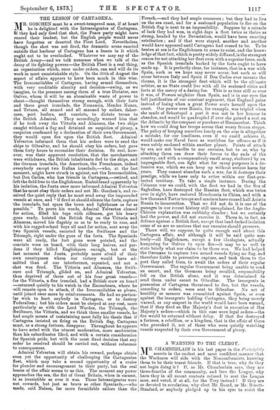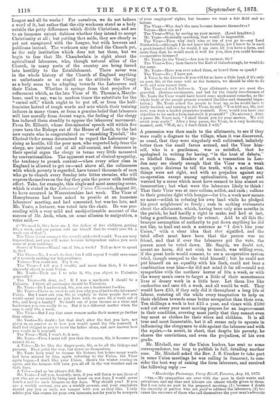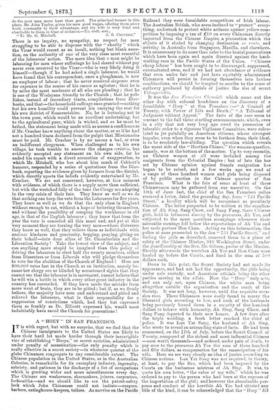A WARNING TO THE CLERGY.
vi R. CHAMBERLAIN in his last paper in the Fortnightly kYL asserts in the coolest and moat confident manner that the Workmen will side with the Nonconformists, knowing them to be their truest friends. If that is true, why do they not begin doing it ? If, as Mr. Chamberlain says, they are three-fourths of the community, and love the League, why have they in all recent contests refused to seat the League man, and voted, if at all, for the Tory instead ? If they are so devoted to secularism, why elect Mr. Boord, or Mr. Benett- Stanford, or anybody pledged up to his eyes to resist the League and all its works ? For ourselves, we do not believe a word of it, but rather that the city workmen stand as a body outside the petty differences which divide Christians, and are to an immense extent dubious whether they intend to accept Christianity at all ; but putting that aside, they are clearly as yet not enraptured with the League, but with brewers and publicans instead. The workmen may defend the Church yet, as the only institution which does not tax them, but we begin to fear that Mr. Chamberlain is right about the agricultural labourers, who, though natural allies of the Church, in many parts of the country are being forced into hostility to the Establishment. There never was in the whole history of the Church of England anything so unfortunate or so stupid as the attitude the Clergy as a body seem to be adopting towards the Labourers and their Union. Whether it springs from that prejudice of refinement which, as the late Vicar of St. Thomas's, Maryle- bone, used to say, was in modern times the substitute for the " carnal self," which ought to be put off, or from the half- feminine hatred of rough words and acts which their training induces in many vicars, or from a genuine belief that labourers will lose morally from decent wages, the feeling of the clergy has induced them steadily to oppose the labourers' movement. From Dr. Ellicott, whose five-minutes' speech will within five years turn the Bishops out of the House of Lords, to the last new curate who is congratulated on "smashing Tyndall," the Clerical Order seems determined to regard the Labourers' up- rising as hostile, till the poor men, who expected help from the clergy, are irritated out of all self-control, and denounce in their special organ the clergy in terms very little measured by conventionalities. The apparent want of clerical sympathy, the tendency to preach content—when every other class in England is allowed to get on—and above all, the callousness with which poverty is regarded, have turned thousands of men who go to church every Sunday into bitter enemies, who will express themselves on the day they gain the power with terrible effect. Take, for example, this single and most annoying scene, which is stated in the Labourers' Union Chronicle, August 30, to have occurred in Worcestershire last week. The Vicar of Honeybourne had been asked to preside at an immense labourers' meeting, and had consented, but was too late, and Mr. Yeats, a lecturer, was voted into the chair. He was pro- ceeding with a very mild and unobjectionable account of the success of Mr. Arch, when, on some allusion to emigration, a voice said,—
Wo need it, Sir; here am I, the father of five children, getting 10s. a week, and our parson told me hisself that ho would save Gd. a week out of that.") The Vicar (from amongst the crowd) said—So I would. You are very improvident, and you will never become independent unless you save some of your earnings. Scores of Voices—What! out of 10s. a week? Tell us how to spend it, Sir?
The Vicar—No, I won't do that; but I still repeat I would save some of it towards making my independence.
Voices—Yon could not. Try it on.
The Vicar—I tell you I would ; and more than that, I do most sincerely object to your Union. Mr. Yeats—Then am I to take it, Sir, you object to Unionists generally ? The Vicar—Oh dear, no ! If I was a mechanic I should be a Unionist. I think all mechanics should be Unionists.
Mr. Yeats—Do I understand, Sir, you are a landowner ?—Yes. Mr. Yeats—I have no need to ask you why you object to the labourers' Union. But I must ask you, Sir, to explain to these people how you would spend your money as you have said, to save Gd. a week out of 10s., and keep a family ? No doubt out of your income as a vicar and landowner you can easily do so. But it is a different matter when the sum is only 10s. a week. The Vicar—But I say that some women make their money go farther than others.
Mr. Yeats—No doubt ; but that don't alter the fact you hay& not given us an answer as to how you would spend the 10s. yourself. I 01111 fool obliged to you to leave the ladies alone, and now answer how you would do it yourself.
The Vicar—Well, I won't do it now.
Mr. Yeats—Then I must toll you that the reason, Sir, is because you cannot do so.
A Voice—Ho be like the finger-posts, Sir, so be all the bishops and parsons. They point the way, but never go themselves.
Mr. Yeats here tried to resume his lecture, but before many words had been uttered by him, again referring to the Union, the Vicar again began—I don't like your Union. Here's the winter coming on again, and tho farmers will turn you all off in the wet weather and on dark days.
A Voice—And so 'un always did, Sir.
Mr. Yeats—I tell you, honestly, men, if you will listen to me, those of you who are so served by being sent home on wet days, I would never touch a tool for such farmers on dry days. Why should you? If you are a weekly servant, you are a weekly servant, and your employers should pay you as such, not tamper with you as they like. I only advise you this course for your own interests, not for you to be usurpers
of your employers' rights, but because we want a fair field and no favour.
The Vicar—Why don't the men become farmers themselves ? Voices—How can us ?
The Vicar—Why, by saving np your money. (Loud laughter.) Mr. Yeats--Generally speaking, that would be impossible. The Vicar—Then why don't nine or ten of you go to—say Lord Northwick--although I do not know his lordship, yet I know he is such. a good-hearted follow ; he would, I am sure, let you have a farm, and more than that, he would stock it well for you, then you could become co-operative farmers? Mr. Yeats (to the Vicar)—Are you in earnest, Sir? The Vicar—Yes ; then there is the Earl of Gainsborough, he would do- the same.
Mr. Yeats—Have you ever asked them, or heard them so speak? The Vicar—No ; I have not. A Voice in the Crowd—If you will let us have a little land, if it's only- an acre, Sir, at the same rate as the farmers, we should be able to do. well, and save money then.
The Vicar—I don't believe it. Your allotments now are most dis- graceful. (Intense excitement, and but for the timely interference of Mr. Yeats the Vicar would have heard some unpleasant remarks, as the- whole body of the people present resented the false and shameful impu- tation.) Mr. Yeats asked the people to bear up, as he would have it fairly decided, and turning to the Vicar, he said, " You told me, Sir, just now, you were a landed proprietor yourself. Now, would you have any- oabjeacutsieonmtro ke,teastuschsat farm,, anshdalslMtchkanikt yyeourusfeolfr?;our(Inro answer.)
your reply." After a long pease the Vicar, in a very hesitating manner, said, "Well, no ; I don't think I wilL"
A procession was then made to the allotments, to see if they were really a disgrace to the village, when it was discovered, as usual, that they were singularly well cultivated, infinitely better than the small farms around, and the Vicar him-- self, who is a gentleman, was so satisfied, that he apologised in writing for having, "in the heat of debate," so libelled them. Readers of such a transaction in Lon- don may see clearly enough that the Vicar was a weak man, quite desirous to tell the truth, with a notion that things were not right, and with no prejudice against any co-operation except among agriculturists, but angry and worried by a scene which must have seemed to him almost an insurrection ; but what were the labourers likely to think That their Vicar was at once callous, selfish, and rash ; callous to their genuine fight with hunger—for 10s. a week now means. no meat—selfish in refusing his own land while he pledged his great neighbours' so freely ; rash in making statements about the allotments, which, having been only nine months in- the parish, he had hardly a right to make, and had at last, being a gentleman, formally to retract. Add to all this the- brusque assumption of authority to put down anything he did not like, to hurl out such a sentence as " I don't like your Union," with a clear idea that that signified, and the total effect must have been that the parson was no- friend, and that if ever the labourers got the vote, the parson must be voted down. Mr. Smyth, we doubt not, meant no harm, did not wish to insult, was willing even, if the great lords would consent, to see a co-operative system tried, though unequal to the trial himself ; but he could not put himself on an equality with his flock, could not bear a combination near him—he did not mind it far off—could not sympathise with the mothers' horror of 10s. a week, or with the weary men's crave to forget a little of their monotonous lives of dreary work in a little beer. Let them live like anchorites and save Gd. a week, and all would be well. They would have £35, if they only did it throughout a long life of labour, resisting all the while every temptation to help on their children towards some better occupation than their own. Ten shillings a week is but £25 a year, and vicars with £100• send out every year most moving prayers for an improvement. in their condition, averring most justly that they cannot even buy meat or clothes for their wives and children. It is all true and most lamentable, but it all seems only to operate in- influehncing the clergymen to aide against the labourer and with the squire,—to assert, in short, that despite his poverty, he shares the convictions, and even the prejudices, of his own grade.
Mr. Mitchell, one of the Union leaders, has sent us some correspondence, too long to publish in full, detailing another case. Mr. Mitchell asked the Rev. J. S. Crncher to take part in some Union meetings he was calling in Somerset, to con- sider the best way of raising the farm labourers, and received the following reply :— "Hanthridge Parsonage, Curry Rivell,Taunton, Aug. 13, 1873.
"Stn,—My sympathies are ever with the poor in their wants and privations, and my time and labours are almost wholly given to them. But I can take no part in the proposed meeting, (1) because I doubt the sincerity of parties who are paid to address the labourers, (2) be- cause the excesses of those who call themselves the poor man's advocate
arriving in Australia from Singapore, Manilla, and elsewhere. the Vicar would resent as an insult, nothing but blank asser- tion, on the authority of one of the very class most resentful of the labourers' action. The mere idea that a man might be which have been again and again directed against the hard- labouring for men whose sufferings he had shared without pay working race in the Pacific States of the Union. "Chinese never even occurred to the Vicar—who is very likely doing it cheap labour" has been sought to be discouraged, suppressed, Babes, instead of incendiary tracts, compilations from Blue- books, and that—the household suffrage once granted—nothing other day with colossal head-lines on the discovery of a but his own humility could prevent his carrying the seat for formidable " Hoey " at San Francisco : A Council of his own district of Somersetshire. No, he is lecturing not to Twenty, with Power of Life and Death ;" " A Tribunal of ths.town poor, which would be an excellent undertaking, but Judgment without Appeal." The facts of the case seem to
warrant to the full these startling announcements, which, even to the agricultural poor, which is wicked, and so he must be
bribed, the statement being made with as serene a confidence as if Mr. Crucher knew anything about the matter, or as if he had not a hundred times declared from the pulpit that Missionaries evidently accepted any statement on his own side, for he namely, was at the bottom of the matter. Up to very recently, ended his report with a direct accusation of exaggeration, to no Chinese women at all were included among the which Mr. Mitchell, who has about him much of Cobbett's emigrants from the Celestial Empire ; but of late the bar humour, responded by a series of quotations from the Blue- book, reporting the evidence given by farmers from the district, begun to be raised, and a few weeks ago we read of which directly upsets the beliefs evidently entertained by Mr. cargo ree Crucher. We are not concerned, however, at this moment with evidence, of which there is a supply more than sufficient, but with the wretched folly of the tone the Clergy are adopting in.the very crisis of their fate. They know as well as wedo that nothing can keep the vote from the Labourers for five years.
They know as
without enough towell eat, without as w a hope of b et do that the onlytering themselves,class in Ene land
do the poor man more hurt than good. The principal farmer in this place, Mr. John Taylor, gives his men good wages, offering them piece work constantly to their advantage, and his wife is very kind and charitable to them in time of sickness.—Yr. obdt. sort.,
"To Mr. G. MitchelL J. S. CIWCIIER."
































 Previous page
Previous page